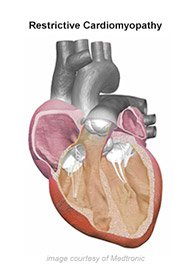RESTRICTIVE (RCM)

Restrictive cardiomyopathy (RCM) is a less common type of cardiomyopathy; only 3 to 5 percent of children diagnosed with cardiomyopathy have RCM. According to the Pediatric Cardiomyopathy Registry, the average age of diagnosis is 5 to 6 years. Some studies suggest that RCM may be slightly more common in girls than boys.
With RCM, the heart has normal pumping function but has difficulty relaxing properly. The heart walls become rigid and are unable to expand properly. As a result, the upper chambers of the heart (atria) become enlarged, while the lower chambers (ventricles) remain normal in size. Eventually, the heart chambers are unable to adequately fill with blood because of stiffness in the heart. With RCM, there is an increased risk of worsening heart failure and sudden cardiac arrest.
While RCM in adults is typically related to another disease, the causes in children are usually unknown (idiopathic). RCM is not typically familial although there have been cases where multiple family members have a combination of hypertrophic and restrictive cardiomyopathy. Some infiltrative disorders can lead to RCM. These include an abnormal protein buildup in the heart (amyloidosis), excess iron in the heart (hemochromatosis), lysosomal storage diseases (Fabry, Gaucher, Hurler disease) and sarcoidosis. Endomyocardial fibrosis is also a common cause in certain tropical areas.
